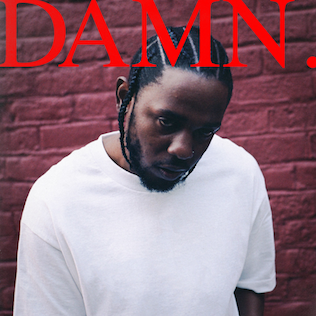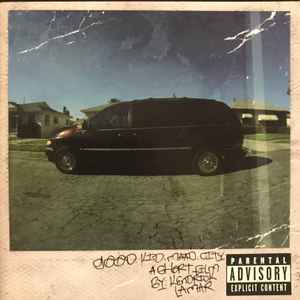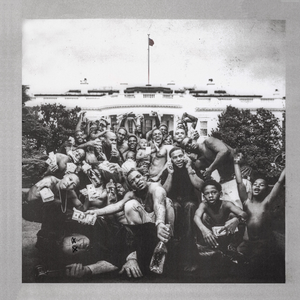Kendrick Lamar, widely considered one of the best hip-hop artists of the 2010’s decade, has one of the most critically-acclaimed catalogs that the genre has ever seen—with 17 GRAMMY awards under his belt, the statistics don’t seem to contradict such a narrative. Today, I will be ranking (subjectively, of course) all five of Kendrick Lamar’s studio albums from worst to best (Kendrick does not have a single “bad” album, but with so much quality in his discography, there has to be a last place spot).
#5: Section 80 (2011) – 7/10
Though a comprehensive debut studio album, filled with jazzy production and conceptually focused on Kendrick’s generation, its main criticisms arise from Kendrick’s performances themselves—not so much in terms of his rapping or his lyricism, which he has solidified even upon his debut, but rather in his approach and consistency towards his own music. As is common with an artist’s debut album or project, it often takes an extended period of time and exposure to the hip-hop genre to most effectively craft an artist’s “voice”, or musical inclination. In Section 80, we see Kendrick’s voice beginning to bloom, with vocal descriptions of life dealing with drugs, racism, and Ronald Reagan’s presidency (as a result of Reagan’s war on drugs), illustrative of his life in Compton as well as of others in his generation and community. Ultimately, while still a solid concept album in its approach to racial and social conflict, much of its spot in last place boils down to a novice Kendrick who lacked experience in the mainstream and its associated tools, namely top-end producers and features.
#4: Mr. Morale & the Big Steppers (2022) – 8/10
Kendrick’s latest studio album takes a different approach and direction when compared to much of his previous works, namely in its introspective nature. On Mr. Morale, Kendrick steps away from his otherwise more traditional topics—social and racial conflict, drugs, and more—in favor of discussing personal issues and state of mind. Included on the album are tracks such as Father Time, where he discusses his journey through fatherhood, as well as numerous mentions of his journey through a sort of therapy—when examining the fact that Kendrick’s last studio album came five years prior, Mr. Morale suggests reasons for Kendrick’s lengthy hiatus from music, perhaps taking time to reflect on his own experiences and work towards incorporating such introspective elements in his music. For many, including myself, it was not what was expected of Kendrick or from his music. Although a pleasant surprise, and nevertheless a great album filled with both touching and exciting moments, I rank it on the lower end of the list simply as a result of personal preference, as such introspective rapping, to me, does not hold the same appeal or provide for me the same level of entertainment as much of Kendrick’s prior works.
#3: DAMN. (2017) – 9/10
Released during what many  would consider the height of Kendrick’s commercial success, the less-focused but generation-blending DAMN. features many of his greatest rapping cuts, with DNA in particular being a personal favorite off of the project. In many ways, the commercial success of the album can be attributed to its mainstream appeal, with more modern rap cuts and even hints of pop appeal, as seen in LOYALTY featuring Rihanna. One aspect of the album which especially appeals to me is the often darker, angrier nature in his delivery on a large handful of tracks, almost suggestive of the album title, “DAMN.”, as being rooted in frustration and distaste with those who surround him in the industry. For newer Kendrick listeners, too, I believe that this is the best album to begin with when taking a delve into his catalog, as it masterfully blends both accessibility on the production and lyrical ends while still being a concept album with diverse storytelling tracks such as FEAR and DUCKWORTH.
would consider the height of Kendrick’s commercial success, the less-focused but generation-blending DAMN. features many of his greatest rapping cuts, with DNA in particular being a personal favorite off of the project. In many ways, the commercial success of the album can be attributed to its mainstream appeal, with more modern rap cuts and even hints of pop appeal, as seen in LOYALTY featuring Rihanna. One aspect of the album which especially appeals to me is the often darker, angrier nature in his delivery on a large handful of tracks, almost suggestive of the album title, “DAMN.”, as being rooted in frustration and distaste with those who surround him in the industry. For newer Kendrick listeners, too, I believe that this is the best album to begin with when taking a delve into his catalog, as it masterfully blends both accessibility on the production and lyrical ends while still being a concept album with diverse storytelling tracks such as FEAR and DUCKWORTH.
#2: good kid, m.A.A.d city (2012) – (10/10)
Kendrick Lamar’s second studio album, good kid, m.A.A.d city, is once again a concept album, focused on his experiences growing up in his hometown—his “m.A.A.d city” so-to-speak—of Compton, California, a suburb of the city of Los Angeles. The suburb, which is often compared to that of Harlem, in New York City, is characterized by high rates of crime, violence, and gang activity. On good kid, m.A.A.d city, just a year after his bursting onto the scene with his studio album titled Section 80, Kendrick Lamar finds himself with a voice, one perfectly crafted for storytelling. The cover for the album itself reads “a short film by Kendrick Lamar”, a short but sweet foreshadowing of what the project entails—a series of lyrical tracks over darker, moody, and atmospheric beats, featuring numerous skits so as to progress the story, the concept, and ultimately the “film” which Lamar puts forward on good kid, m.A.A.d city. Much of its success can also be owed to the rise in Kendrick’s popularity, whereby he was able to secure features from the likes of Drake and Jay Rock while enlisting the help of renowned producer Dr. Dre as executive producer of the album. The cherry on top for Kendrick’s second studio album is his ability, despite the deep, conceptual nature of the project, to still generate hit records, with tracks such as Money Trees finding their way into mainstream culture even in 2024.
#1: To Pimp a Butterfly (2015) – (10/10)
The decision as to which album would take the number one spot—a heavily contested fight between good kid, m.A.A.d city and To Pimp a Butterfly—was no easy task. For the purposes of this blog, I had to pick a number one (ties are no fun) and thus went with the album which, in the present moment, I believe has an edge. To begin, Kendrick Lamar’s third studio album contains what I believe to be the best song in his otherwise vast catalog: Wesley’s Theory, a lyrically-dense discussion of race and wealth in twentieth-century America, characterized itself by Kendrick’s own experiences in his meteoric rise to fame. The track begins with a portrayal of Kendrick himself, overwhelmed by vast amounts of money which he previously lacked access to, and later shifts to a discussion of “Uncle Sam” and the United States, which he paints as trying to appease Kendrick—ultimately, a metaphorical means of highlighting economic exploitation of African Americans. Though hard to believe, such quality in the writing continues throughout the entirety of the album, with tracks such as “u” containing emotionally dense outbursts of Kendrick’s pent up anxiety, anger, depression, and exhaustion. To Pimp a Butterfly is a must listen, not solely intended for Kendrick fans, hip-hop fans, or even music fans. This is an album for everyone. I promise you won’t be disappointed.
Good job on this blog! I honestly know very little about Kendrick Lamar and his music, and this blog was incredibly informative! One of my good friends loves Kendrick Lamar, and I never quite understood the hype, but I can definitely respect his work, especially after reading this blog and seeing how introspective some of his albums have been, focusing on issues such as racism, classism, and other social/political injustices. I’ve struggled with listening to rap because it’s usually pretty negative, though your blog reinforced the idea that a lot of rappers grew up in low-income families, affecting their childhoods and ultimately what they choose to write about in their music. I think it’s really cool how one of his albums focused more on his state of mind, journey through fatherhood, and how he learned to work through some of the issues he encountered. It’s always super interesting to see how artists fluctuate throughout their career and how their music changes as an effect. Your blog did an amazing job at capturing this phenomenon and holistically approaching Kendrick and his music! Amazing job on this blog post, it was very well thought-out and I learned a lot!
Aarohan, While I do not usually read your blog, I am so grateful that I decided to click on yours this week. I am a huge fan of Kendrick Lamar, and with all of the rap beef going on right now I think his discography is under a lot of scrutiny, and unjustly so in my opinion. I firmly believe that he has one of if not the best discography in all of hip hop, so I would like to chime in on what you say for each album. I couldn’t agree more with your thoughts on section 80, as It is lacking a lot of what we expect from a hip-hop album, even in 2011. Despite this, I think Kendrick was still able to get a message out through this album, which is something his music has come to be known for. I really liked MMATBS, as I thought the concept of airing out all of his grievances and getting really deep into his own story was something very rarely seen in music today. I think it also helped the listener to understand why Kendrick has seemed to be absent for the last 5 years of pop culture, and I think it would be a very awkward transition to go from 5 years of music to a (still rumored) collab album with Baby Keem. I definitely see where the criticism comes from though, as I feel like a lot of people were expecting a more Damn-like sound from this project. For your other three reviews, I 100% agree with each of them, especially when you said that TPAB was an album for everyone. This album had everyone and their mom listening to it, I mean it even had Barak Obama listening to it regularly. I mean this album didn’t win Kendrick a Politzer prize for nothing. Overall though, I really liked your thoughts on each album, and while our views differed slightly at times, I think we can both agree that Kendrick Lamar is by far the most influential hip-hop artist of our time.
I would definitely have to agree with nearly every single part of this blog and ranking of Kendrick Lamar’s discography besides maybe switching first and second place. I think you were very spot on with Section 80, all in all it is a good album and it does really good job at painting a picture and it has some solid story telling within some of the songs. However, Kendrick’s voice and style isn’t as solidified and therefore the album just isn’t as good as a result.I would agree that although for some people, the introspective rapping really hit home for them, and I think there is definitely a time and place where I really enjoy this album, overall I don’t really turn back to it often as I kinda like more superficial music, but I appreciate the album 100%. DAMN is very good just not in my top 2. I don’t know why, but I absolutely love GKMC so much for some reason it just has to be my 1, I can just listen to the album on repeat and literally never get bored. I do understand how TPAB is overall better objectively, but subjectively I think it has to be 2nd for me.
GREAT music review! I know his music casually, but I love a good album review. Nice job 🙂